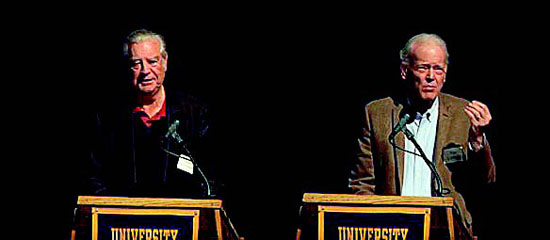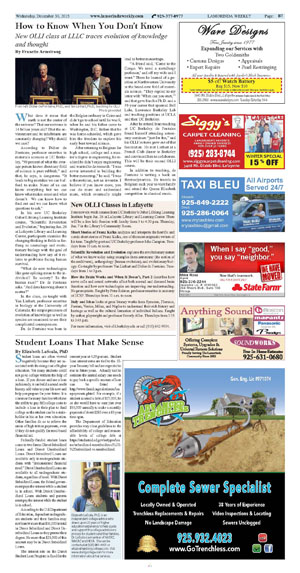|
|
Published December 30th. 2015
|
How to Know When You Don't Know
|
| New OLLI class at LLLC traces evolution of knowledge and thought |
| By Franette Armstrong |
 |
| From left: Didier de Fontaine, Ph.D., and Yan Linhart, Ph.D., teaching for OLLI Photo provided |
What does it mean that earth is not the center of the universe? That our universe is 14 billion years old? That the environment and its inhabitants are constantly changing? Why should we care?
 According to Didier de Fontaine, professor emeritus in materials sciences at UC Berkeley, "90 percent of what the average person knows about any field of science is pure rubbish," and that, he says, is dangerous. "It leads to big mistakes we can't afford to make. None of us can know everything but we can know what makes sense and what doesn't. We can know how to find out and we can know what questions to ask."
According to Didier de Fontaine, professor emeritus in materials sciences at UC Berkeley, "90 percent of what the average person knows about any field of science is pure rubbish," and that, he says, is dangerous. "It leads to big mistakes we can't afford to make. None of us can know everything but we can know what makes sense and what doesn't. We can know how to find out and we can know what questions to ask."
 In his new UC Berkeley Osher Lifelong Learning Institute course, "Scientific Revolution and Evolution," beginning Jan. 26 at Lafayette Library and Learning Center, participants examine the changing thinking in fields as far-flung as cosmology and evolutionary biology with the goal of understanding how any of it relates to problems facing human survival.
In his new UC Berkeley Osher Lifelong Learning Institute course, "Scientific Revolution and Evolution," beginning Jan. 26 at Lafayette Library and Learning Center, participants examine the changing thinking in fields as far-flung as cosmology and evolutionary biology with the goal of understanding how any of it relates to problems facing human survival.
 "What do new technologies like gene splicing mean to the individual? To society? To the human race?" Dr. de Fontaine asks. "And does knowing about it matter?"
"What do new technologies like gene splicing mean to the individual? To society? To the human race?" Dr. de Fontaine asks. "And does knowing about it matter?"
 In the class, co-taught with Yan Linhart, professor emeritus in biology at the University of Colorado, the simple processes of evolution of knowledge as well as species are examined to see their complicated consequences.
In the class, co-taught with Yan Linhart, professor emeritus in biology at the University of Colorado, the simple processes of evolution of knowledge as well as species are examined to see their complicated consequences.
 Dr. de Fontaine was born in the Belgian embassy in Cairo and didn't go to school until he was 9, when he and his father came to Washington, D.C. Before that he was home-schooled, which gave him the freedom to explore his early bent toward science.
Dr. de Fontaine was born in the Belgian embassy in Cairo and didn't go to school until he was 9, when he and his father came to Washington, D.C. Before that he was home-schooled, which gave him the freedom to explore his early bent toward science.
 After returning to Belgium for high school, college and a master's degree in engineering, he realized he didn't enjoy engineering and wanted to do research. "I was never interested in building the better mousetrap," he said. "I was a theoretician, not an inventor. I believe if you know more, you can do more and understand more, which eventually might lead to better mousetraps.
After returning to Belgium for high school, college and a master's degree in engineering, he realized he didn't enjoy engineering and wanted to do research. "I was never interested in building the better mousetrap," he said. "I was a theoretician, not an inventor. I believe if you know more, you can do more and understand more, which eventually might lead to better mousetraps.
 "A friend said, 'Come to the Congo. We need a metallurgy professor,' and off my wife and I went." There he learned of a position at Northwestern University in the brand-new field of materials science. "They replied to my letter with 'When can you start,'" and that gave him his Ph.D. and a 30-year career that spanned Bell Labs, Lawrence Berkeley Lab and teaching positions at UCLA and then UC Berkeley.
"A friend said, 'Come to the Congo. We need a metallurgy professor,' and off my wife and I went." There he learned of a position at Northwestern University in the brand-new field of materials science. "They replied to my letter with 'When can you start,'" and that gave him his Ph.D. and a 30-year career that spanned Bell Labs, Lawrence Berkeley Lab and teaching positions at UCLA and then UC Berkeley.
 After he retired from teaching at UC Berkeley, de Fontaine found himself attending astronomy seminars "just for fun," and his OLLI lectures grew out of that fascination. He met Linhart at a French Club dinner in Berkeley and convinced him to collaborate. This will be their second OLLI course.
After he retired from teaching at UC Berkeley, de Fontaine found himself attending astronomy seminars "just for fun," and his OLLI lectures grew out of that fascination. He met Linhart at a French Club dinner in Berkeley and convinced him to collaborate. This will be their second OLLI course.
 In addition to teaching, de Fontaine is writing a book on thermodynamics. He travels to Belgium each year to visit family and attend the Queen Elisabeth competition in classical music.
In addition to teaching, de Fontaine is writing a book on thermodynamics. He travels to Belgium each year to visit family and attend the Queen Elisabeth competition in classical music.
 New OLLI Classes in Lafayette
New OLLI Classes in Lafayette
 Four new six-week courses from UC Berkeley's Osher Lifelong Learning Institute begin Jan. 26 at Lafayette Library and Learning Center. There will be a free Info Session with faculty from 3 to 4:30 p.m. Thursday, Jan. 7 in the Library's Community Room.
Four new six-week courses from UC Berkeley's Osher Lifelong Learning Institute begin Jan. 26 at Lafayette Library and Learning Center. There will be a free Info Session with faculty from 3 to 4:30 p.m. Thursday, Jan. 7 in the Library's Community Room.

 Short Stories of Franz Kafka analyzes and interprets the horrific and comic short stories of Franz Kafka, one of the most enigmatic writers of his time. Taught by poet and UC Berkeley professor John Campion. Tuesdays from 10 a.m. to noon.
Short Stories of Franz Kafka analyzes and interprets the horrific and comic short stories of Franz Kafka, one of the most enigmatic writers of his time. Taught by poet and UC Berkeley professor John Campion. Tuesdays from 10 a.m. to noon.

 Scientific Revolution and Evolution explores the revolutionary nature of what we know today using examples from astronomy (the notion of the multiverse), anthropology (human evolution), and evolutionary biology. Co-taught by professors Yan Linhart and Didier de Fontaine. Tuesdays from 1 to 3 p.m.
Scientific Revolution and Evolution explores the revolutionary nature of what we know today using examples from astronomy (the notion of the multiverse), anthropology (human evolution), and evolutionary biology. Co-taught by professors Yan Linhart and Didier de Fontaine. Tuesdays from 1 to 3 p.m.

 How the Brain Works and When It Doesn't, Part 2 describes how nerve cells and neural networks affect both normal and diseased brain function and how new technologies are improving our understanding. No prerequisite. Taught by Peter Ralston, professor emeritus in anatomy at UCSF. Thursdays from 10 a.m. to noon.
How the Brain Works and When It Doesn't, Part 2 describes how nerve cells and neural networks affect both normal and diseased brain function and how new technologies are improving our understanding. No prerequisite. Taught by Peter Ralston, professor emeritus in anatomy at UCSF. Thursdays from 10 a.m. to noon.

 Italy and Ideas looks at great literary works from Syracuse, Florence, Ferrara, Venice, Milan, and Naples to understand their rich history and heritage as well as the cultural formation of individual Italians. Taught by author, playwright and professor Beverly Allen. Thursdays from 1:15 to 3:45 p.m.
Italy and Ideas looks at great literary works from Syracuse, Florence, Ferrara, Venice, Milan, and Naples to understand their rich history and heritage as well as the cultural formation of individual Italians. Taught by author, playwright and professor Beverly Allen. Thursdays from 1:15 to 3:45 p.m.

 For more information, visit www.olli.berkeley.edu or call (510) 642-9934.
For more information, visit www.olli.berkeley.edu or call (510) 642-9934.

|
|
|
|
|
|
|
|
|
| |
|
|
|
|



